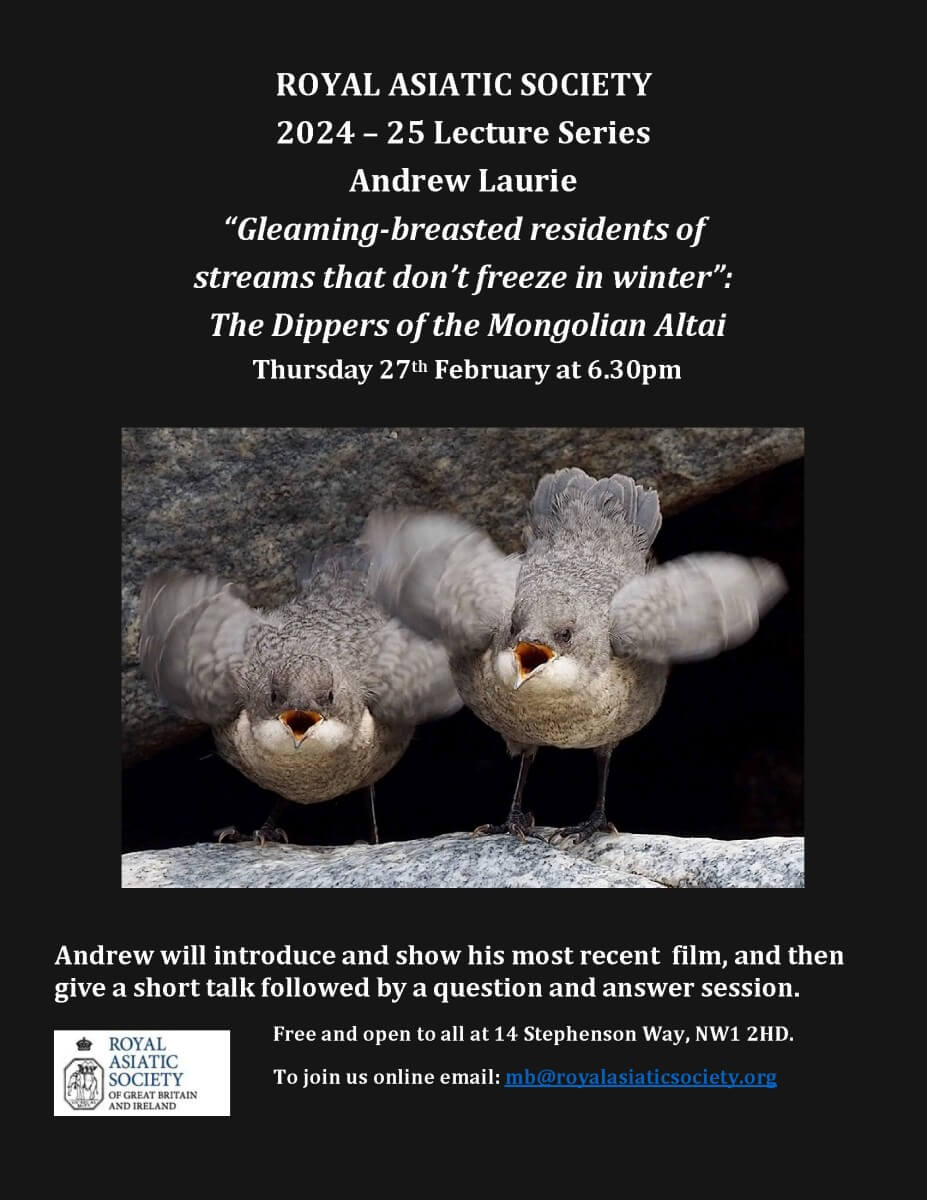
- This event has passed.
Andrew Laurie: “Gleaming-breasted residents of streams that don’t freeze in winter”: the Dippers of the Mongolian Altai

Andrew Laurie grew up in Shropshire, spent a lot of his childhood watching animals, and studied biology at the University of Cambridge, doing research on hippos in Tanzania, starfish in Sudan, and rhinos in Nepal, India and south-east Asia. After a seven year research fellowship studying Marine Iguanas in the Galapagos Islands he worked on wildlife conservation projects, including government planning and policy development, mainly in China, Mongolia, Tanzania and Sri Lanka, with shorter assignments in Vietnam, the UK, India, Laos, Cape Verde, and the Cook Islands. He is concerned about the rapid loss of wild species and their habitats around the world, and is keen to help in establishing better behaviour patterns in humans, through both governmental policy and implementation, and actions taken by the general public and non-governmental organizations to protect the natural environment on which we all depend.
Andrew once worked as an advisor to the Mongolian government on biodiversity conservation – and lived there on and off for several years. In his spare time he followed up on a childhood fascination with Dippers after seeing them gathering in winter on the outflow of a spring where the water flowed for up to a kilometre before freezing. On summer field trips he kept his eyes open for nests, because none of the local ornithologists actually knew where they bred, but he didn’t find any.
Several years later, in 2017, following up on a clue sent to him by Prof. Gombobaatar of the National University of Mongolia, Andrew returned to Mongolia, and soon found Dippers nesting. He has been back several times since then to observe and film at different stages of the breeding season. Although his four films focus on Dippers, they also reflect in general on wildlife conservation in Mongolia, and they were shown on Mongolian television in a series called “Anyone can be an ecologist” – a title that he tried not to take personally. The idea behind the series was to encourage “citizen science”, and the premise that you don’t have to have a huge research grant, a Toyota Land Cruiser and a satellite tracking device , or to concentrate on large charismatic endangered species, in order to make useful contributions to science, or conservation.
There are five species of Dippers in the world. The White-throated Dipper ranges from Europe to Mongolia, India and China, but there are various subspecies that look quite different. In the Altai there is further variation within the local subspecies – some have lighter coloured heads and bellies than others.
Andrew is biologist, cameraman, director and editor, and works with a small field crew in Mongolia – non-specialists who are very enthusiastic, and full of ideas and possible explanations for their observations. Interesting differences in behaviour between the European and Altai Dippers have emerged. For example, in the Altai the males routinely feed the females on and off the nest during incubation whereas this has only very rarely been observed in Europe. In 2022 Andrew and his team saw really extraordinary behaviour that has still not been explained: the parents stood on the backs of their chicks after they had left the nest, and pecked at them repeatedly. And one female cleared out the nest lining immediately after the last chick had left. Clearing the nest is common in Europe but not at the intensity and single-mindedness observed and within just minutes of the last chick leaving.
The team talked with local people, mainly livestock herders, learning from them on the one hand, and and showing them things on the other. Although familiar with seeing Dippers flying around none of the local people they talked with had seen a nest or sat and watched Dippers doing things like feeding their young or clearing out the lining from their nests.
The presence of a healthy population of Dippers is a good indicator that the water is unpolluted – or at least not badly polluted. Threats to the Altai Dippers include overstocking of livestock, mining, and melting glaciers – a complex mix. Eventually tourism might add to them.
Pride in local species could contribute to conservation action by residents – although the demands of everyday life in that difficult environment make it hard for many to find time to participate. And climate change overshadows everything – many herders are already moving out of the Altai as they see no long term future there.
